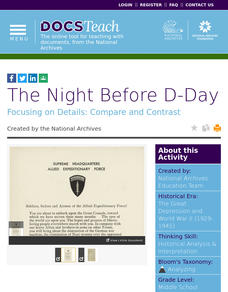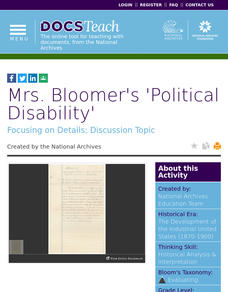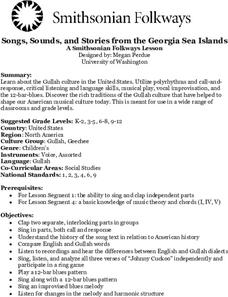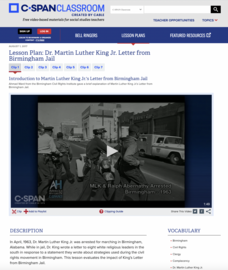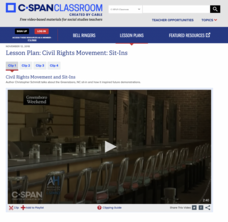DocsTeach
The School Lunch Program and the Federal Government
The school lunch program is rooted in the struggles of the Great Depression and is still assisting families today. Academics research documents and images relating to the creation of the school lunch program. Scholars use a worksheet to...
DocsTeach
The Night Before D-Day
Get inside the mind of General Eisenhower regarding the D-Day invasion. An interesting activity uses historical documents to highlight the differences between Eisenhower's public stance on D-Day and his private opinions. Scholars analyze...
DocsTeach
The New Deal: Revolution or Reform?
Scholars weigh in on FDR's New Deal policies in an in-depth activity. The resource uses historical documents to explore whether the New Deal polices were reformatory or revolutionary. Learners review documents, rate them using a scale,...
DocsTeach
Pearl Harbor Dispatch Analysis
Scholars play a historical version of the telephone game when they analyze the dispatch from the Pearl Harbor attack. The quick activity uses primary sources to help academics analyze an historical event. Young historians also complete a...
DocsTeach
Letter to Truman about the Manhattan Project
Delve into the past to understand the opposition to the Manhattan Project. An interesting activity is designed to be completed in pairs, groups, or individually. Scholars analyze historical documents, complete an online worksheet, and...
DocsTeach
Analyzing a Writing Assignment by a Teenage Refugee in New York During World War II
Young historians delve into the world of teenage refugees during WWII to understand their experiences. The activity focuses on a writing assignment from a teen staying at a US refugee camp to explore the struggles they faced, such as...
DocsTeach
The Settlement of the American West
What do Abraham Lincoln and the Transcontinental Railroad have in common? Using a set of primary source documents, including pictures, maps, and treaties, class members link together the common themes of expansion into the American West....
DocsTeach
Reasons for Westward Expansion
"Go West, young man!" is a familiar refrain in American history. But why did people leave their homes in the East to travel westward and what impact did that movement have on people already living in the American West? By examining...
DocsTeach
Mrs. Bloomer's 'Political Disability'
It's hard to believe that women had to argue for the right to vote a mere 100 years ago. Today, young historians can examine their case left behind in primary sources. Using a letter from a woman who claimed she should be able to vote...
DocsTeach
The Civil War as Photographed by Mathew Brady
While there are no photographs of actual battles during the Civil War, the pictures of Matthew Brady still paint a vivid image of what life was like as a solider. Using a series of photographs, including those of camp life and the...
Museum of the American Revolution
Leadership and Alexander Hamilton
Alexander Hamilton serves as a model in a lesson that asks young political scientists to consider the strengths and weaknesses of six different leadership styles. They read a brief overview of Hamilton's activities before, during, and...
Smithsonian Institution
Songs, Sounds and Stories from the Georgia Sea Islands
American music is the result of the influence of many cultures, including the traditions brought by the African slaves. Young scholars study the polyrhythms, the call-and-response format, and the vocal improvisations of the Gullah...
C-SPAN
Last Days of Martin Luther King, Jr.
On April 4, 1968, Dr. Martin Luther King, Jr. was assassinated in Memphis, Tennessee. Four video clips reveal the events of that time, including the shift in the focus of the Civil Rights Movement, the aftermath of the assassination, and...
DocsTeach
Analyzing Einstein's Citizenship Application
Albert Einstein contributed greatly to America's history, but he wasn't always a citizen. An engaging activity analyzes Einstein's citizenship application to understand the process of immigration and how it impacts those trying to reach...
DocsTeach
Analyzing a Letter from Jackie Robinson: "Fair Play and Justice"
Jackie Robinson was more than a baseball legend; he was an activist, too. An interesting resource explores Robinson's time in the military using primary sources. Scholars examine the racially inspired event that led to a court martial...
DocsTeach
Oh Freedom! Sought Under the Fugitive Slave Act
Using the harrowing story of the Crafts, a couple enslaved in the South who escaped to freedom, young historians trace the story of the Fugitive Slave Act. After examining documents, including affidavits and arrest warrants for the...
DocsTeach
Lincoln's 1863 Thanksgiving Proclamation
While most Americans connect the celebration of Thanksgiving to a colonial celebration of pilgrims and Native Americans, the national holiday was actually the product of a war-time measure by Abraham Lincoln during the Civil War....
C-SPAN
1968: The Poor People's Campaign
The Poor People's Campaign of 1968 marked a shift in the civil rights movement to economic issues. Speakers in four C-SPAN video clips discuss different aspects of the campaign including Resurrection City, the Economic Bill of Rights,...
PBS
Out of the Shadows | Black America Since MLK: And Still I Rise
Two powerful video clips launch a study of race relations in the United States after the Selma, Alabama riots, the passage of the Votings Rights Act, and the riots in Watts, California.
PBS
Keep Your Head Up | Black America Since MLK: And Still I Rise
Change may be slow in coming, but things do change. Oprah Winfrey and Black Entertainment Television CEO, Robert L. Johnson, discuss the opportunities available to them due to the efforts of Dr. Martin Luther King, Jr. and other civil...
C-SPAN
Dr. Martin Luther King Jr.'s Letter from Birmingham Jail
Timing is everything. Introduce young historians to Dr. Martin Luther King, Jr.'s "Letter from Birmingham Jail" with a resource that underscores the significance of the timing of the Good Friday Birmingham march, King's subsequent...
C-SPAN
Civil Rights Movement: Sit-Ins
Part of the protests of the Civil Rights Movement were small scale sit-ins at lunch counters. This form of on-the-ground activism is the focus of a C-SPAN resource that includes four video-clips about the sit-ins by pupils at a lunch...
Smithsonian Institution
Spirits Across the Ocean: Yoruban and Dahomean Cultures in the Caribbean Brought by the Slave Trade
Much of Latin American music owes its origins to the slave trade. Peoples from the Yoruban and Dahomean cultures brought with them the distinctive rhythms, time signatures, and eighth note patterns that now characterize Caribbean music....
Smithsonian Institution
The Vocal Blues: Created in the Deep South of the U.S.
Bring the sounds of the deep South vocal blues to the classroom with a Smithsonian Folkways lesson. In preparation, scholars listen to and count the 12 bar blues patterns in several works and identify the I, II, IV, and V chords as well...



